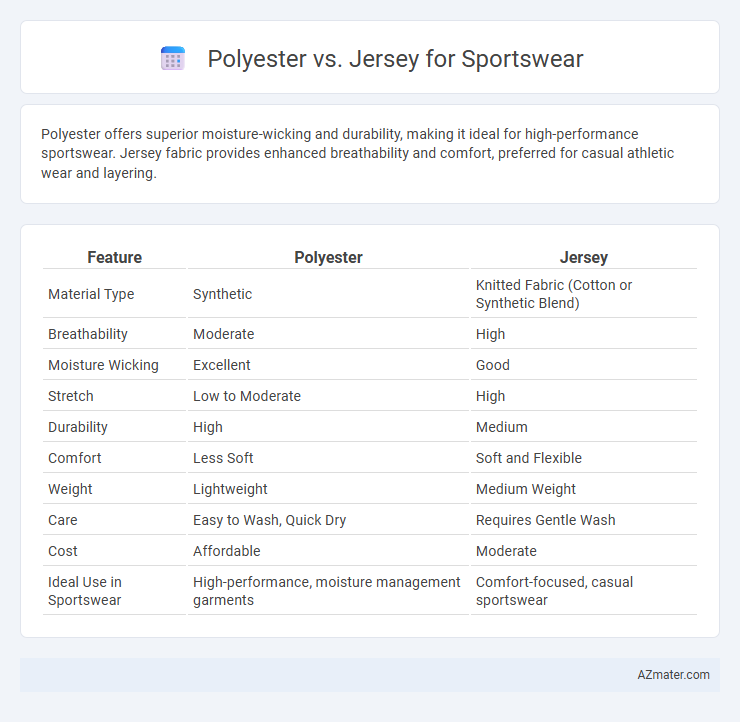Polyester offers superior moisture-wicking and durability, making it ideal for high-performance sportswear. Jersey fabric provides enhanced breathability and comfort, preferred for casual athletic wear and layering.
Table of Comparison
| Feature | Polyester | Jersey |
|---|---|---|
| Material Type | Synthetic | Knitted Fabric (Cotton or Synthetic Blend) |
| Breathability | Moderate | High |
| Moisture Wicking | Excellent | Good |
| Stretch | Low to Moderate | High |
| Durability | High | Medium |
| Comfort | Less Soft | Soft and Flexible |
| Weight | Lightweight | Medium Weight |
| Care | Easy to Wash, Quick Dry | Requires Gentle Wash |
| Cost | Affordable | Moderate |
| Ideal Use in Sportswear | High-performance, moisture management garments | Comfort-focused, casual sportswear |
Introduction to Sportswear Fabrics
Polyester dominates sportswear fabrics due to its moisture-wicking properties, durability, and quick-drying capabilities, making it ideal for high-intensity activities. Jersey fabric, typically a knit textile made from cotton or synthetic fibers, offers superior softness, stretchability, and breathability, enhancing comfort in low- to moderate-impact sports. Choosing between polyester and jersey depends on balancing performance needs with comfort preferences, as polyester excels in technical functionality while jersey provides a more natural feel and flexibility.
What is Polyester?
Polyester is a synthetic fiber known for its durability, moisture-wicking properties, and resistance to shrinking and stretching, making it ideal for sportswear. It maintains its shape and dries quickly, enhancing comfort during high-intensity activities. The fabric's lightweight and breathable nature supports temperature regulation, crucial for athletic performance.
What is Jersey Fabric?
Jersey fabric is a soft, stretchy knit textile commonly made from cotton, synthetic fibers, or blends, prized for its breathability and moisture-wicking properties in sportswear. Unlike woven polyester, jersey offers superior flexibility and comfort, adapting well to dynamic movements during physical activity. Its looped knit structure enhances durability while maintaining lightweight softness, making it a popular choice for athletic apparel.
Key Differences: Polyester vs Jersey
Polyester fabric is known for its moisture-wicking properties, durability, and resistance to shrinking, making it ideal for high-performance sportswear. Jersey, typically a knit fabric made from cotton or a cotton blend, offers superior softness, breathability, and stretch, enhancing comfort during low-impact activities. Choosing between polyester and jersey depends on the balance needed between performance features like sweat management and comfort attributes such as flexibility and texture.
Breathability and Moisture Management
Polyester sportswear offers excellent moisture-wicking capabilities, pulling sweat away from the skin to keep athletes dry during intense activities. Jersey fabric, often made from cotton or cotton blends, provides superior breathability, allowing better air circulation but tends to retain moisture longer. Choosing between polyester and jersey depends on balancing moisture management needs with comfort and ventilation preferences for optimal sportswear performance.
Comfort and Fit Comparison
Polyester sportswear offers moisture-wicking properties and durability, making it ideal for high-intensity activities where sweat management is crucial. Jersey fabric, typically made from cotton or a cotton blend, provides superior softness and breathability, enhancing comfort during low to moderate exercise. The elastic nature of jersey ensures a snug but flexible fit, while polyester's woven structure offers more shape retention but less stretch.
Durability and Maintenance
Polyester offers superior durability for sportswear, resisting abrasions, stretching, and shrinking, making it ideal for intense physical activities. Jersey fabric, while softer and more breathable, tends to wear out faster and may require gentler maintenance to preserve its texture. Maintenance of polyester sportswear is simpler due to its quick-drying, wrinkle-resistant properties, whereas jersey benefits from careful washing to avoid pilling and fabric degradation.
Cost and Affordability
Polyester sportswear is generally more affordable due to its widespread production and synthetic fiber composition, making it a cost-effective option for budget-conscious consumers. Jersey fabric, while offering greater comfort and breathability thanks to its knit structure, tends to be pricier because of higher quality natural fibers or blends used in manufacturing. Choosing between polyester and jersey for sportswear depends on balancing cost efficiency with desired comfort and performance features.
Best Uses for Each Fabric in Sportswear
Polyester excels in sportswear for its moisture-wicking properties and durability, making it ideal for high-intensity activities like running and cycling where sweat management and fabric resilience are critical. Jersey fabric, known for its softness, breathability, and stretch, is perfect for low-impact sports or casual wear such as yoga and gym sessions that prioritize comfort and flexibility. Choosing polyester supports performance with quick-drying and odor resistance, while jersey enhances comfort and freedom of movement during athletic routines.
Which Fabric Should You Choose?
Polyester offers superior moisture-wicking and durability, making it ideal for high-intensity sportswear that requires quick drying and long-lasting performance. Jersey fabric, typically softer and more breathable, excels in comfort and flexibility, suitable for low to moderate activity levels and casual athletic wear. Choose polyester for activities demanding robust sweat management and resilience, while jersey is best for comfort and ease of movement in less intense workouts.

Infographic: Polyester vs Jersey for Sportswear
 azmater.com
azmater.com